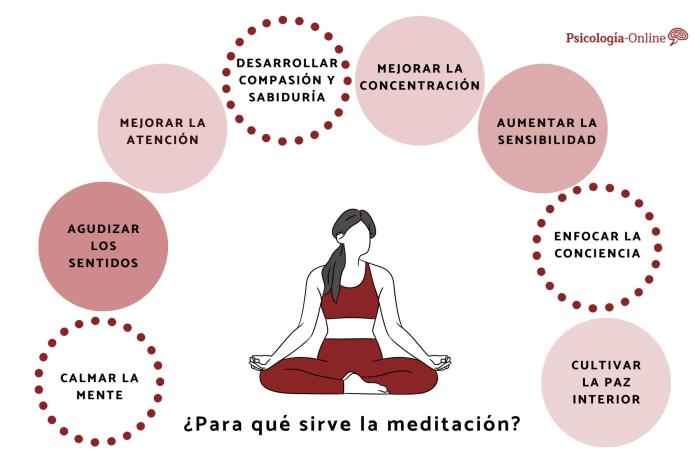15 Reasons to Practice Meditation for Mental Health sets the stage for this enthralling narrative, offering readers a glimpse into a story that is rich in detail with elegant maluku style and brimming with originality from the outset.
Embark on a journey through the transformative power of meditation as we delve into its profound impact on mental well-being and inner balance.
Introduction to Meditation

Meditation is a practice that involves focusing the mind and eliminating distractions to achieve a state of clarity and inner peace. It has been used for centuries as a way to improve mental health and overall well-being. The purpose of meditation in mental health is to reduce stress, anxiety, and depression, enhance emotional health, increase self-awareness, and promote relaxation.
Types of Meditation Practices
There are several types of meditation practices, each with its own unique techniques and benefits:
- Mindfulness Meditation: Involves focusing on the present moment without judgment, observing thoughts and sensations as they arise.
- Transcendental Meditation: Involves silently repeating a mantra to transcend to a state of pure awareness and consciousness.
- Loving-Kindness Meditation: Focuses on cultivating feelings of love and compassion towards oneself and others.
- Guided Meditation: Involves following the guidance of a teacher or recorded audio to lead you through a meditation practice.
History and Cultural Significance of Meditation
Meditation has roots in ancient Eastern traditions, particularly in Hinduism and Buddhism. It has been practiced for thousands of years as a spiritual and mental discipline to attain enlightenment and self-realization. In the Western world, meditation gained popularity in the 20th century as a tool for stress reduction and improving mental health. Today, meditation is practiced worldwide and has become an integral part of many cultures and belief systems.
Benefits of Meditation for Mental Health
Meditation has numerous benefits for mental health, providing a range of positive effects on our overall well-being. These benefits are supported by scientific evidence and personal experiences, showcasing the transformative power of meditation practices.
1. Reduces Stress and Anxiety
Meditation techniques have been shown to decrease stress and anxiety levels by promoting relaxation and reducing the production of stress hormones.
2. Improves Focus and Concentration
Regular meditation practice can enhance cognitive functions, such as focus and concentration, leading to improved productivity and mental clarity.
3. Enhances Emotional Well-being
By cultivating mindfulness and self-awareness, meditation helps individuals manage their emotions better, leading to greater emotional stability and resilience.
4. Boosts Memory Retention
Studies have indicated that meditation can improve memory retention and recall abilities, making it a valuable tool for enhancing cognitive function.
5. Promotes Better Sleep
Practicing meditation before bedtime can help individuals relax and unwind, leading to improved sleep quality and better overall rest.
6. Reduces Symptoms of Depression
Meditation has been found to be effective in reducing symptoms of depression by regulating mood and promoting a more positive outlook on life.
7. Enhances Self-Awareness
Through introspection and mindfulness, meditation helps individuals develop a deeper understanding of themselves, their thoughts, and emotions.
8. Increases Patience and Tolerance
Regular meditation practice fosters patience and tolerance, enabling individuals to respond to challenging situations with greater calmness and resilience.
9. Strengthens Resilience to Stress
By training the mind to stay present and focused, meditation builds resilience to stressors, allowing individuals to cope with adversity more effectively.
10. Improves Decision-Making Skills, 15 Reasons to Practice Meditation for Mental Health
Meditation enhances cognitive flexibility and decision-making skills by promoting mental clarity and reducing impulsivity.
11. Boosts Creativity
Engaging in mindful meditation practices can stimulate creative thinking and problem-solving abilities by encouraging divergent thinking and new perspectives.
12. Enhances Interpersonal Relationships
Through increased self-awareness and empathy, meditation can improve communication skills and foster healthier relationships with others.
13. Reduces Symptoms of PTSD
Research suggests that meditation can alleviate symptoms of post-traumatic stress disorder (PTSD) by promoting emotional regulation and processing traumatic experiences.
14. Supports Addiction Recovery
Meditation can be a valuable tool in addiction recovery by reducing cravings, managing triggers, and promoting self-control and self-awareness.
15. Cultivates Gratitude and Positivity
Practicing gratitude meditation can foster a sense of appreciation and positivity, leading to a more optimistic and fulfilling outlook on life.
How to Start Meditating

Starting a meditation practice can seem intimidating for beginners, but it is actually quite simple to get started. Here are some steps to help you begin your meditation journey.
Setting Up Your Space
Creating a conducive environment for meditation is essential for a successful practice. Choose a quiet and comfortable space where you won’t be disturbed. You can also enhance the ambiance with soft lighting, calming scents, and comfortable cushions or mats.
Choosing a Time
Decide on a time of day that works best for you to meditate consistently. Whether it’s first thing in the morning, during a lunch break, or before bed, find a time that fits into your schedule and stick to it.
Starting with Short Sessions
Begin with short meditation sessions, such as 5-10 minutes, to gradually build your practice. As you become more comfortable, you can increase the duration of your sessions.
Posture and Breathing Techniques
Sit comfortably with your back straight and shoulders relaxed. Close your eyes and focus on your breath, taking slow and deep breaths. You can also explore different breathing techniques like diaphragmatic breathing or alternate nostril breathing.
Common Misconceptions About Meditation
One common misconception about meditation is that you need to clear your mind completely. In reality, it’s normal for thoughts to arise during meditation. Instead of trying to stop them, simply acknowledge them and gently guide your focus back to your breath or a mantra.
Tips for Overcoming Resistance
If you find yourself resisting meditation, start with short and manageable sessions. Remind yourself of the benefits of meditation for your mental health and overall well-being. You can also try guided meditation apps or classes to help you stay motivated.
Consistency is Key
Consistency is key when it comes to building a meditation practice. Make a commitment to meditate daily, even if it’s just for a few minutes. Over time, you’ll notice the positive impact it has on your mental health.
Meditation Techniques for Mental Health: 15 Reasons To Practice Meditation For Mental Health

When it comes to utilizing meditation for mental health, it is essential to explore different techniques that can cater to specific conditions such as anxiety, depression, stress, and more. Each technique offers unique benefits that can help individuals manage their mental well-being effectively.
Mindfulness Meditation
- Mindfulness meditation involves focusing on the present moment without judgment, allowing individuals to observe their thoughts and feelings without getting caught up in them.
- Benefits include reducing stress, anxiety, and symptoms of depression by promoting self-awareness and emotional regulation.
Loving-Kindness Meditation
- Loving-kindness meditation involves cultivating feelings of compassion and empathy towards oneself and others.
- Benefits include enhancing feelings of connectedness, reducing negative emotions, and fostering a sense of well-being.
Transcendental Meditation
- Transcendental meditation utilizes silently repeated mantras to achieve a state of relaxed awareness.
- Benefits include reducing blood pressure, anxiety, and symptoms of PTSD, while improving focus and creativity.
Choosing the Right Meditation Technique
When selecting a meditation technique based on individual needs, it is crucial to consider personal preferences, mental health goals, and lifestyle factors. Consulting with a meditation teacher or mental health professional can also provide valuable guidance in finding the most suitable approach.
Mindfulness and Meditation

Mindfulness is the practice of bringing awareness to the present moment without judgment. It is closely related to meditation, as meditation often involves focusing on the present moment and observing thoughts and sensations without attachment.Meditation can enhance mental health through mindfulness practices by helping individuals become more aware of their thoughts and emotions. This increased awareness can lead to better emotional regulation, reduced stress, and improved overall well-being.
Incorporating Mindfulness into Meditation
- Start each meditation session by focusing on your breath and bringing your attention to the present moment.
- Notice any thoughts or emotions that arise during meditation without getting caught up in them.
- Practice body scan meditations to bring awareness to physical sensations and promote relaxation.
- Use guided meditations that focus on mindfulness, such as loving-kindness meditation or mindful walking.
- Incorporate mindfulness into daily activities, such as eating or walking, by paying full attention to the experience without distractions.
Last Point

As we conclude this exploration of the myriad benefits of meditation for mental health, one thing remains clear – the practice of meditation is a gateway to a harmonious and tranquil mind. Embrace these 15 reasons and unlock the path to a healthier and happier self through the art of mindfulness and meditation.